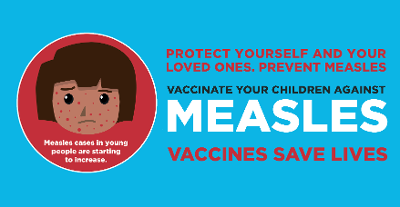Protect your family from measles amid national case rise
Amid a rise in measles cases across England, residents are being urged to ensure they and their families have the best possible defence - the MMR vaccine.

Article date: 23 November 2023
As part of the UK routine vaccine schedule children should have received two doses of MMR vaccine by the age of 5, protecting them for life against measles, mumps and rubella.
If you are not sure your child is up to date with their MMR vaccination, check their health record or contact your GP. You're also encouraged to check if you're a frontline health or social care worker.
Uptake of the MMR vaccine in St Helens Borough has declined in recent years and is currently below the level necessary to protect communities from outbreaks.
Since 2022, measles cases have been increasing globally and in the UK. Most cases of measles in the UK since the start of this year were reported in London but several cases have also been reported in the Northwest of England.
Measles is an infection that spreads very easily and can cause serious problems in some people. In most cases, measles can make you feel miserable with a fever, runny or blocked nose, sneezing, cough, red and sore, watery eyes, and red or dark spots (depending on your skin colour).
The spots appear a few days after cold-like symptoms, start on the face and behind the ears before spreading to the rest of the body. Measles can be unpleasant, but most people will recover in 7-10 days without experiencing further health problems.
Occasionally however, measles can lead to more serious problems such as pneumonia, meningitis, blindness and seizures. If a pregnant woman gets measles, it can harm the unborn baby.
Councillor Anthony Burns, St Helens Borough Council's Cabinet Member for Wellbeing, Culture and Heritage, said:
"Data from the World Health Organisation estimates the measles vaccine has saved 17.1 million lives worldwide since 2000, from a common childhood illness that can lead to some very serious and life-threatening health issues.
"Measles is easily passed on from one person to another through coughs and sneezes, from four days before the onset of rash to four days afterwards. If you come into contact with someone who has measles when they are infectious it is likely that you catch measles unless you have already had both doses of the MMR vaccination or had measles before."
"If you are unsure if you or your child is up to date with their vaccines including MMR the easiest way is to look at your child's red book or to check with their GP or health visitor."
More information about the symptoms of measles and what to do about them can be found on the NHS website at www.nhs.uk/conditions/measles.




